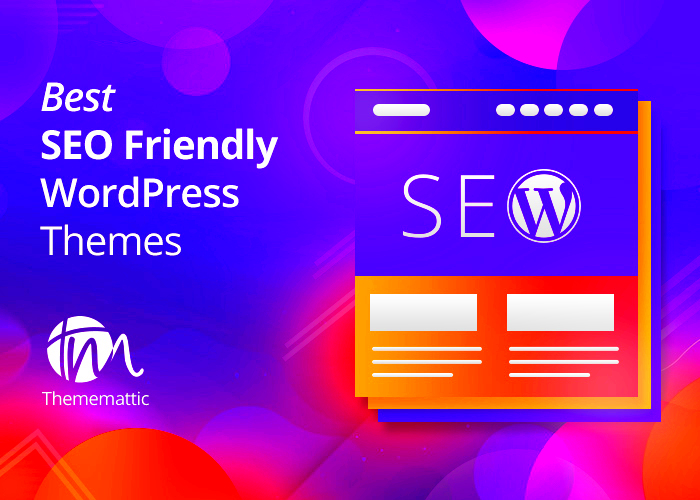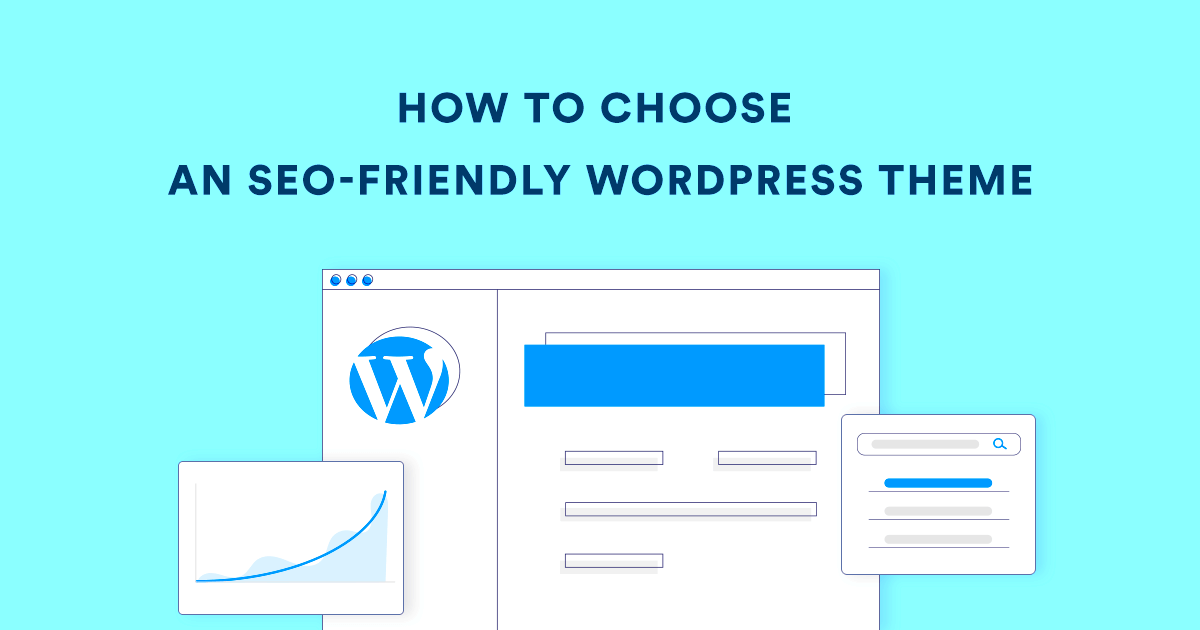When it comes to running a successful website, Search Engine Optimization (SEO) is like the secret sauce. It’s all about making your site attractive to search engines so they can rank it higher in search results. This is especially crucial if you’re using WordPress, the most popular content management system out there. But why is having an SEO-friendly theme so important?
First off, an SEO-friendly theme lays the groundwork for effective optimization. Think of it as a well-structured building: if the foundation is solid, everything else follows seamlessly. A theme designed with SEO in mind will ensure that search engines can crawl your site easily, making it easier for you to rank for your desired keywords.
Additionally, an SEO-friendly theme often leads to a better user experience. Fast loading times, mobile responsiveness, and easy navigation not only help retain visitors but also signal to search engines that your site is valuable. Remember, user experience is a significant ranking factor!
Ultimately, investing time in choosing the right SEO-friendly theme can save you headaches down the road. Let’s dive in and explore some key features that can help you select the perfect theme for optimal SEO performance.
Key Features to Look For in an SEO-Friendly WordPress Theme

When you’re on the hunt for an SEO-friendly WordPress theme, there are several crucial features to keep in mind. Let’s break them down:
- Fast Loading Speed: A theme that loads quickly is imperative. Search engines favor sites that perform efficiently. You can check the speed of your theme using tools like Google PageSpeed Insights.
- Mobile Responsiveness: More than half of web traffic comes from mobile devices. Ensure the theme is designed to adapt to different screen sizes without losing functionality.
- Clean Code: Themes with well-organized and clean coding allow for faster loading times and better crawlability by search engines. Look for themes with valid HTML and CSS.
- Schema Markup Support: This helps search engines understand the context of your content. Make sure your theme supports schema markup, which can enhance your site’s visibility in search results.
- Easy Customization: An SEO-friendly theme should allow you to easily customize titles, meta descriptions, and other important elements without needing to code.
- Compatibility with SEO Plugins: Ensure the theme is compatible with popular SEO plugins like Yoast SEO or Rank Math to help you further optimize your content.
By keeping these features in mind, you can choose a WordPress theme that not only meets your aesthetic needs but also supports your SEO efforts effectively. This combination will help you climb the search engine rankings and attract more visitors to your site!
How to Evaluate a Theme’s SEO Performance

Choosing the right WordPress theme is crucial for the success of your website, especially if you want to boost your search engine rankings. So, how do you evaluate a theme’s SEO performance? Let’s dive into some key aspects to consider.
- Code Quality: Look for themes that follow clean coding standards. Themes with messy or outdated code can hinder your site’s performance and SEO. You can use tools like W3C Validator to check for coding issues.
- Responsiveness: Ensure your theme is mobile-friendly. Google prioritizes mobile-responsive designs, so run your website through Google’s Mobile-Friendly Test tool.
- Loading Speed: Page speed is a ranking factor. Check how quickly your theme loads using tools like Google PageSpeed Insights. A theme should not only look good but also load quickly to provide a better user experience.
- Schema Markup: Many SEO-friendly themes come with built-in schema markup options, which help search engines understand your content better. Check if your theme supports schema markup.
- SEO Plugins Compatibility: Your theme should work seamlessly with popular SEO plugins like Yoast SEO or All in One SEO Pack. Check for testimonials or reviews from users who have successfully optimized their sites using the theme you’ve chosen.
By considering these criteria, you can effectively evaluate the SEO performance of any WordPress theme you’re interested in. After all, a well-performing theme is the foundation of a successful SEO strategy!
Best Practices for Optimizing Your SEO-Friendly Theme

Once you’ve chosen an SEO-friendly theme, the next step is to optimize it fully for better search engine performance. Here are some best practices you can follow:
- Use a Child Theme: If you plan to make customizations, it’s best to use a child theme. This way, your changes won’t be lost when the theme undergoes updates.
- Optimize Images: Large images can slow down your site significantly. Use image optimization plugins like Smush to compress your images without sacrificing quality.
- Leverage Caching: Implement caching solutions like W3 Total Cache or WP Super Cache to speed up your site.
- Customize Titles and Meta Descriptions: Use your SEO plugin to modify title tags and meta descriptions for each page. Make these as compelling as possible to increase click-through rates from search results.
- Maintain a Clean Navigation Structure: A clear and intuitive navigation helps search engines crawl your site more effectively. Keep menus simple and logically structured.
- Regularly Update Your Theme: Ensure your theme is always updated to its latest version for security and performance enhancements. Regular updates can also help you maintain your SEO rankings.
By following these best practices, you can enhance the SEO-friendliness of your WordPress theme and help your website achieve the visibility it deserves in search engine results!
Top SEO-Friendly WordPress Themes to Consider
When it comes to selecting a WordPress theme, there are so many options available that it can feel overwhelming. However, picking an SEO-friendly theme can have a significant impact on your website’s search engine ranking. Here are some top themes to consider that not only look great but are optimized for SEO:
- Astra – A lightweight and customizable theme, Astra is designed for speed and flexibility. Its SEO features ensure that your site loads quickly and performs well in search results.
- GeneratePress – This theme offers a minimalist design while providing powerful SEO features. GeneratePress is optimized for mobile devices, ensuring a good experience on all screen sizes.
- OceanWP – OceanWP is versatile and packed with features that enhance SEO. Its compatibility with popular page builders also allows you to create stunning layouts easily.
- Divi – Known for its drag-and-drop builder, Divi offers an easy way to create beautiful websites. Its built-in SEO options help you optimize content without needing any extra plugins.
- Schema – As the name suggests, this theme is built with Schema.org standards in mind, which can help search engines understand your site’s content better. It’s fast-loading and SEO-friendly from the get-go.
Choosing any of these themes will not only enhance your website’s aesthetic appeal but also improve its chances of ranking higher on search engine results. Remember, the right theme is just the beginning; you still need to optimize your content!
Common Mistakes to Avoid with WordPress Themes and SEO
Crafting a successful SEO strategy is not just about selecting the right keywords and producing high-quality content. Choosing the wrong theme can compromise your SEO efforts significantly. Here are some common mistakes to avoid:
- Ignoring Mobile Responsiveness – With mobile searches on the rise, it’s essential to choose a mobile-friendly theme. A non-responsive design can lead to poor user experiences and lower search rankings.
- Overloading with Features – While it’s tempting to use a theme with a lot of bells and whistles, excess features can slow down your website. A slow loading site can frustrate users and harm your SEO rankings.
- Skipping Schema Markup – Not all themes come with built-in Schema markup. Leaving this out can hinder search engines from properly understanding your content, which may affect visibility.
- Not Optimizing Images – Many themes default to high-resolution images, which can increase page load times. Always optimize images for faster loading and better performance.
- Neglecting Updates – Failing to keep your theme up-to-date can expose your site to security risks and compatibility issues, ultimately affecting your site’s performance and rankings.
By avoiding these pitfalls, you can ensure that your WordPress theme complements your SEO efforts rather than hinders them. Always take the time to evaluate your theme choice and its potential impact on your overall SEO strategy!
How to Make Sure Your WordPress Theme Is SEO-Friendly
Choosing the right WordPress theme plays a significant role in the SEO performance of your website. An SEO-friendly theme not only enhances user experience but also improves your chances of ranking higher on search engine results pages (SERPs). Here are some key elements to consider when selecting a theme:
- Responsive Design: Ensure your theme is mobile-friendly. Google prioritizes mobile-first indexing, so a responsive design is crucial.
- Speed Optimization: Choose a lightweight theme that loads quickly. Use tools like Google PageSpeed Insights to evaluate your theme’s performance.
- Schema Markup: Look for themes that support schema markup to help search engines understand your content better.
- Customizable URLs: Your theme should allow easy customization of permalinks to create SEO-friendly URLs.
- Fast Loading Times: Opt for themes that minimize external scripts and provide clean code to enhance loading speed.
- Compatibility with SEO Plugins: Make sure your theme integrates well with popular SEO plugins like Yoast SEO or All in One SEO.
- Easy Content Formatting: Choose themes that enable straightforward formatting options, allowing you to create engaging content easily.
- High-Quality Support: Ensure the theme developers provide regular updates and prompt support, which can impact your site’s security and performance.
In summary, selecting an SEO-friendly WordPress theme is a critical component of your website’s overall success. By prioritizing features such as responsive design, speed optimization, and plugin compatibility, you can create a robust online presence that enhances visibility and user engagement.



